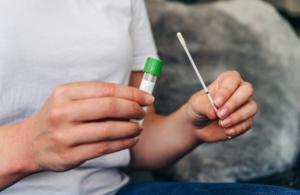- Two-thirds of UK adults – 35 million – have been vaccinated with a first dose of a COVID-19 jab
- More than 16.7 million people in the UK vaccinated with a second dose of a COVID-19 jab
- Public urged to get the jab when their time comes and do their bit to send the virus into retreat
Two-thirds of UK adults have received their first dose of a COVID-19 vaccine.
Health services across the UK have now administered a total of 51.8 million vaccines between 8 December and 7 May, including 35 million people with their first dose (66.6%) and 16.7 million with their second (31.8%).
The government met its target of vaccinating the most vulnerable by 15 April, and remains on track to offer a first dose to all adults by the end of July.
Health and Social Care Secretary Matt Hancock said:
This has been a truly national effort, with NHS and care staff and volunteers coming together across the UK to deliver the vaccine at an incredible pace, saving thousands of lives.
One jab at a time, the approved vaccines are helping to send this virus into retreat, with coronavirus cases and deaths now at their lowest levels since the start of the pandemic. I strongly encourage everyone to take up the offer when it comes so we can put this pandemic behind us.
Data from Public Health England’s real-world study shows the vaccines are already having a significant impact in the UK, reducing hospitalisations and deaths, saving more than 10,000 lives in England by the end of March.
The latest vaccine effectiveness data from PHE show that in those aged over 70, both the Pfizer/BioNTech and Oxford/AstraZeneca vaccines reduce the risk of getting symptomatic disease by around 60% after a single dose.
This protection lasts for several weeks. In those aged over 80, protection against hospitalisation is around 80% and the Pfizer/BioNTech vaccine is 85% effective at stopping people aged over 80 dying from COVID-19.
Data from the ONS and Oxford University shows that COVID-19 infections fell significantly, by 65% after the first dose of the Oxford/AstraZeneca or Pfizer/BioNTech vaccines, rising further after the second dose.
Vaccines Minister Nadhim Zahawi said:
Two thirds of the adult population have now been vaccinated with one dose in the UK – an incredible achievement.
It is now more important than ever to come forward for the second dose, so we can ensure everyone has the absolute strongest possible protection from this dreadful virus.
I encourage everyone to book their jab as soon as they’re offered it, and to come back for their second dose. It’s never too late to come forward if you are eligible.
An extra 60 million doses of the Pfizer/BioNTech vaccine have been secured by the UK government to help support preparations for the booster COVID-19 vaccination programme from the autumn if clinically needed.
All vaccines being used in the UK have met the independent Medicines and Healthcare products Regulatory Agency’s strict standards of safety, effectiveness and quality.
Rolling reviews are underway by the MHRA to assess the Janssen and Novavax vaccines.
Approved vaccines are available from thousands of NHS vaccine centres, GP practices and pharmacies. Around 98% of people live within 10 miles of a vaccination centre in England and vaccinations are taking place at sites including mosques, community centres and football stadiums.
- The latest UK-wide vaccination statistics are published here and NHS England publishes vaccine statistics for England here.
- PHE’s real-world data on the efficacy of COVID-19 vaccines is available here. Their latest study on household transmission can be found here.
- The ONS survey on ‘Barriers to COVID-19 vaccination’ can be found here.
- To date, the government has invested over £300 million into manufacturing a successful vaccine to enable a rapid roll out.
- The UK has secured early access to 517 million doses of eight of the most promising vaccine candidates. This includes agreements with:
- BioNTech/Pfizer for 100 million doses
- Valneva for 100 million doses
- Oxford/AstraZeneca who will work to supply 100 million doses of the vaccine being developed by Oxford University
- GlaxoSmithKline and Sanofi Pasteur to buy 60 million doses
- Novavax for 60 million doses
- Janssen for 30 million doses of their not-for-profit vaccine, alongside funding of their Phase 3 clinical trial
- Moderna for 17 million doses
- CureVac for 50 million doses
- The UK government is committed to supporting equitable access to vaccines worldwide. The UK is the largest donor to the COVAX facility, the global mechanism to help developing countries access a coronavirus vaccine, and has committed £548 million in UK aid to help distribute 1.3 billion doses of coronavirus vaccines to 92 developing countries this year.

